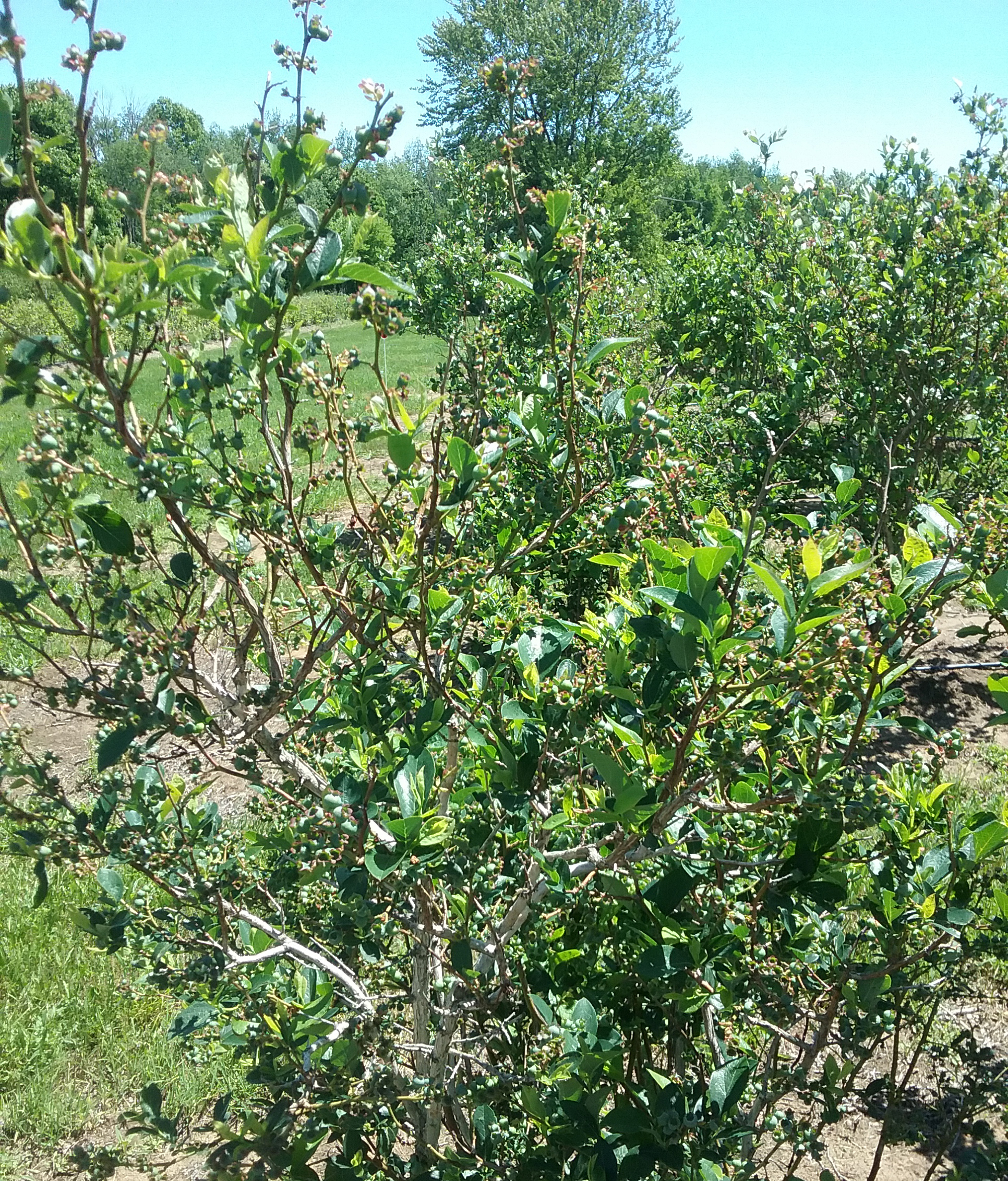West central Michigan small fruit update – June 5, 2018
The blueberry bloom period is almost over in all varieties. Pollination looks good and bees need to be out of the field to apply the next insecticide/fungicide applications against fruitworms and fruit rots.

Prevailing weather conditions over the past two week in west central Michigan favored a rapid growth and development of all small fruit crops, and the small fruit production season advanced rapidly. For blueberries, the bloom period has finished for the most part with only small number of fields close to Lake Michigan still showing some 10 to 20 percent bloom. However, in general, early-season varieties are already in the green fruit stage and for late-season varieties the petal fall period is over. Also, June-bearing strawberries are moving along very fast and bloom is over in all varieties.
Regarding weather conditions in the region, for the past seven days, temperature remained around the upper 80s and low 90s. On average, minimum temperatures were 61 degrees Fahrenheit and maximum temperatures 81 F. The past two weeks of good weather advanced the season by three to four days ahead from the same dates in 2017. In 2017, the growing degree-day (GDD) accumulations since Jan. 1 (base 50 F) up until June 5 in west central Michigan was between 514 and 521 GDD. This year, the GDD accumulation is between 535 and 544 GDD.
Current weather conditions for the most part have been dry, with some scattered rains in the area that produced between 1 and 1.5 inches of rain. Most rains were in the southern portion of Allegan County. Some locations accumulated up to 1.5 inches and blueberry fields were difficult to work. This affected insecticide and fungicide applications that were programed for the past weekend.
As we continue monitoring the progress of the blueberry season, we are finding more damage caused by winter temperatures occurring in January and February. In addition to farms in the Zeeland-West Olive, Michigan area, fields in Nunica and Conklin, Michigan, are also with some degree of damage. However, the damage is localized at low areas within fields or blueberry fields surrounded by woods. All blueberry varieties suffered some degree of damage, but Elliott seems to be the most affected variety at Nunica. Bluecrop also shows some damage that in some cases it may reduce the yield by about 20-25 percent with respect to non-affected fields (see photos).

Bluecrop in Conklin, Michigan, affected by winter temperatures. Picture shows shoots with plenty of fruit, but no leaves to support their growth. Leaf buds were killed by winter temperatures.
Regarding the presence of insect and disease problems in blueberries, as of June 5 we have seen a large emergence of overwintering cranberry fruitworm around Fennville with little cherry fruitworm activity. From current trapping information, it seems that the major fruitworm problem will be related to cranberry fruitworm. A large emergence of overwintering moths means a potential problem for fields without monitoring traps because the fruitworm populations will stay longer in the field and their control may need more than one application of insecticide. Without monitoring devises, growers could miss the appropriate timing for fruitworm control.
For those unable to spray for fruitworm control during the past week due to the presence of rains, do it as soon as possible. If the bees have been removed, use Lannate, Imidan or Asana LX. Also, check the extended weather forecast for the next 24 to 72 hours to make a good selection of the appropriate insecticide. For example, the extended weather forecast for Grand Junction for the next six days indicates there is a 60 to 76 percent chance of rain for the next Friday and Saturday. Selecting Imidan for that area will not be the most appropriate choice since the product could be affected by rain and the control period will be shortened.
Confirm or Intrepid could be used if pollinators are present. Confirm can be used in Michigan counties where Intrepid is restricted by Endangered Species Act regulations stating that Intrepid cannot be used "within one mile of sandy habitat that supports wild lupine plants." This affects only Allegan, Monroe, Montcalm, Muskegon, Newaygo and Oceana counties. For insecticides and dose, please check the “2018 Fruit Management Guide,” MSU Extension bulletin E-154. Extension Bulletin E-154.
2018 Systems Approach to Manage Spotted Wing Drosophila (SWD): Training for Berry Growers
MSU Extension and Michigan Food and Farming Systems invite growers, field managers, pest consultants and everyone involved in insect pest management in blueberries, raspberries and strawberries to attend our first 2018 Spotted Wing Drosophila (SWD) Integrated Pest Management (IPM) Workshop on Friday, June 15, from 1 to 5 p.m. at the Trevor Nichols Research Center, 6237 124th Avenue, Fennville, MI 49408.
There is a $25 fee that includes materials and refreshments. Pre-registration is required. There will be four RUP Recertification for attending this training. Online registration and agenda will follow soon.



 Print
Print Email
Email
